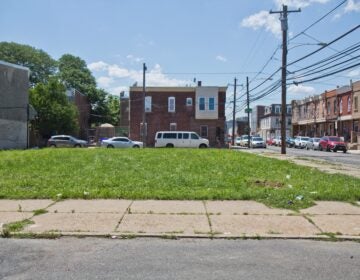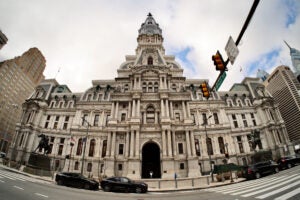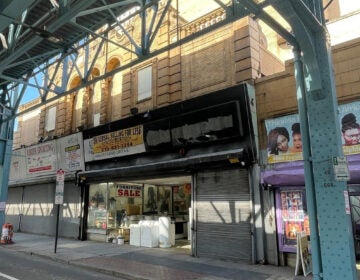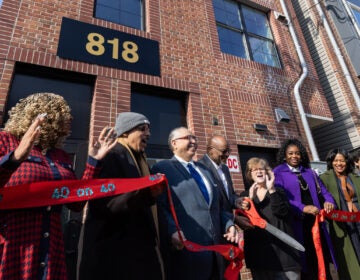‘The system needs to be blown up’: Critics tell lawmakers Philly’s Land Bank needs change
While the Land Bank has disposed of hundreds of public parcels, its processes are widely considered too complex, opaque and slow.
Listen 1:37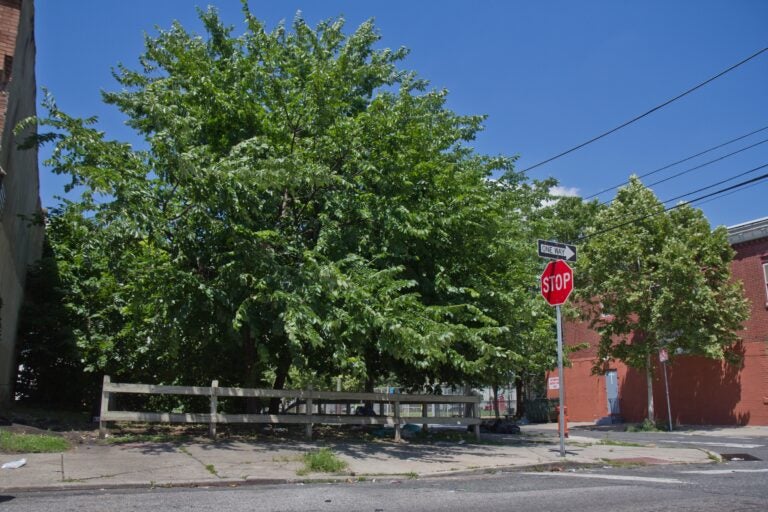
The Turn the Key program aims to create energy-efficient, affordable housing for city employees or income-eligible first-time homebuyers. The first homes will be built on publicly owned land, like a lot on the 3000 block of Wharton Street in South Philadelphia. (Kimberly Paynter/WHYY)
Have a question about Philly’s neighborhoods or the systems that shape them? PlanPhilly reporters want to hear from you! Ask us a question or send us a story idea you think we should cover.
Real estate developer Tayyib Smith doesn’t mince words when talking about the Philadelphia Land Bank and its process for disposing of public parcels.
“The system needs to be blown up — reimagined,” said Smith, one-half of S&R Holdings.
His forceful words are rooted in his personal experience with the Land Bank, an episode Smith still does not completely comprehend.
In 2019, his company was chosen to develop an affordable housing project on a group of city-owned lots in West Philadelphia. The project required Smith and his partners to obtain parcels from the Land Bank.
Years later, the development is in limbo — partly because those parcels are still with the Land Bank — a fact that baffles Smith after all the time and resources his company devoted to pushing the project forward.
“The Land Bank was designed to streamline the process of transferring vacant and blighted properties into the hands of developers who are committed to serving the public good. But instead, it has become a bottleneck,” Smith said.
He shared his frustrations during a public hearing Wednesday that was part performance review and part strategy session.
Council members heard from community development corporations, real estate developers, community gardeners and government officials for more than four hours. And like Smith, most of them agreed that when it comes to the Land Bank, there is still much room for improvement.
“We believe the Land Bank has failed to live up to its expectations,” said Rick Sauer, executive director of the Philadelphia Association of Community Development Corporation.
The hearing unfolded as Mayor Cherelle Parker’s administration prepares to release a strategic plan to preserve or build 30,000 housing units over the next four years. The mayor has said she wants to continue using the Land Bank to help grow the city’s supply of affordable housing amid an ongoing crisis.
Authorized by state legislation in 2012, the Land Bank is a quasi-governmental clearinghouse that puts vacant city-owned land into productive use. It often serves as the front door of the city’s land disposition process, which relies on other city agencies and City Council to coordinate with the land bank.
In any given year, the bulk of the bank’s disposed properties are used for affordable housing projects, including homes built through the popular Turn the Key program. A much smaller percentage of parcels are used to establish community gardens and other open spaces designed to serve the community.
The goal is to help communities shaped by decades of disinvestment and neighborhoods contending with rapid gentrification.
On Wednesday, critics told lawmakers the Land Bank’s processes remain too complex, opaque and slow, making it harder to meet those ambitious objectives. They say there’s a perception that private developers are having an easier time obtaining city-owned land than the community groups and nonprofits submitting applications.
“We hope this hearing and further work by City Council and the administration lead to a Philadelphia Land Bank that is strategic, transparent and accountable,” said Will Gonzalez, executive director of Ceiba, a coalition promoting economic development in the city’s Latino communities.
Gonzalez and others called on the Land Bank to develop a new strategic plan, release annual reports, improve how it tracks applications and communicate better with applicants. In many cases, they said, people have no idea where things stand with their application, sometimes waiting months to find out about a mistake or a rejection.
Edward McColly, director of real estate for Habitat for Humanity Philadelphia, said the turnaround time for an application has delayed some of his organization’s projects by months.
For example, an application submitted in March 2023 is still pending more than a year later.
“When we then are expending those resources with particular sites in mind, and are then unable to then really have any feedback on the status of that application or whether it is being taken seriously as a potential Habitat site, those are resources we could be spending elsewhere to assist other families,” McColly said.
Angel Rodriguez, executive director of the Land Bank, pushed back on some of the criticisms raised Wednesday, saying that some witnesses failed to provide council members with important details surrounding certain applications. He acknowledged his agency is only partially fulfilling its stated mission, adding there are internal efforts underway to improve the Land Bank’s processes.
He also said that the agency needs a new strategic plan and that one is forthcoming. The Land Bank is operating off a draft of a strategic plan completed in 2019.
“I think in some ways we are fulfilling that mission and in some ways we are not,” Rodriguez said.
Critics hoped Wednesday’s discussion, one of several over the years, would finally help move things in the right direction, particularly when advocates fear the city’s shortage of affordable housing will only continue to grow.
“It’s sad that after 10 years, we’re looking at how to fix something rather than how to propel it forward,” Gonzalez said.
 This story is a part of Every Voice, Every Vote, a collaborative project managed by The Lenfest Institute for Journalism. The William Penn Foundation provides lead support for Every Voice, Every Vote in 2024 and 2025 with additional funding from The Lenfest Institute for Journalism, Comcast NBC Universal, The John S. and James L. Knight Foundation, Henry L. Kimelman Family Foundation, Judy and Peter Leone, Arctos Foundation, Wyncote Foundation, 25th Century Foundation, and Dolfinger-McMahon Foundation.
This story is a part of Every Voice, Every Vote, a collaborative project managed by The Lenfest Institute for Journalism. The William Penn Foundation provides lead support for Every Voice, Every Vote in 2024 and 2025 with additional funding from The Lenfest Institute for Journalism, Comcast NBC Universal, The John S. and James L. Knight Foundation, Henry L. Kimelman Family Foundation, Judy and Peter Leone, Arctos Foundation, Wyncote Foundation, 25th Century Foundation, and Dolfinger-McMahon Foundation.
To learn more about the project and view a full list of supporters, visit www.everyvoice-everyvote.org. Editorial content is created independently of the project’s donors.

Subscribe to PlanPhilly
WHYY is your source for fact-based, in-depth journalism and information. As a nonprofit organization, we rely on financial support from readers like you. Please give today.





